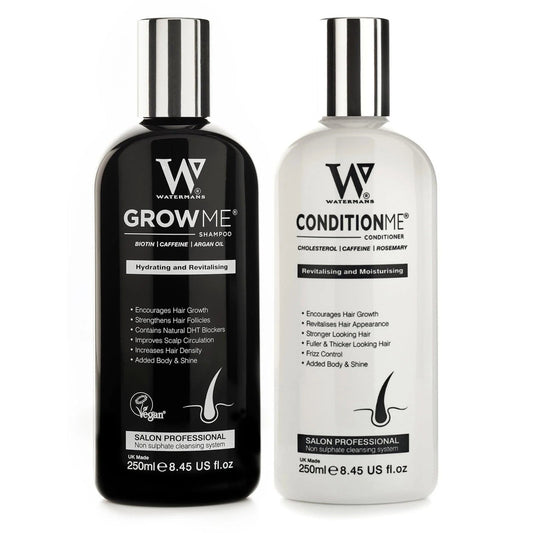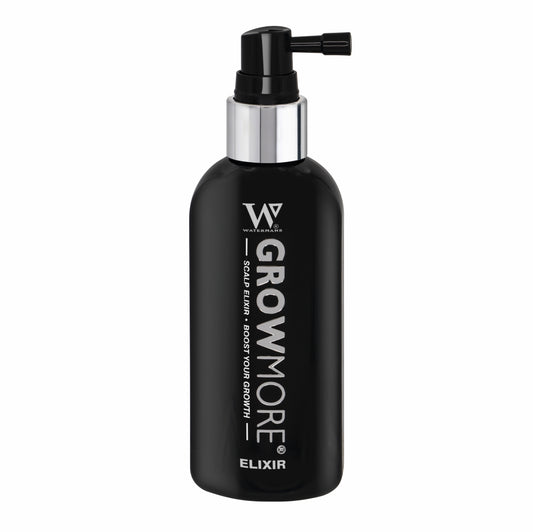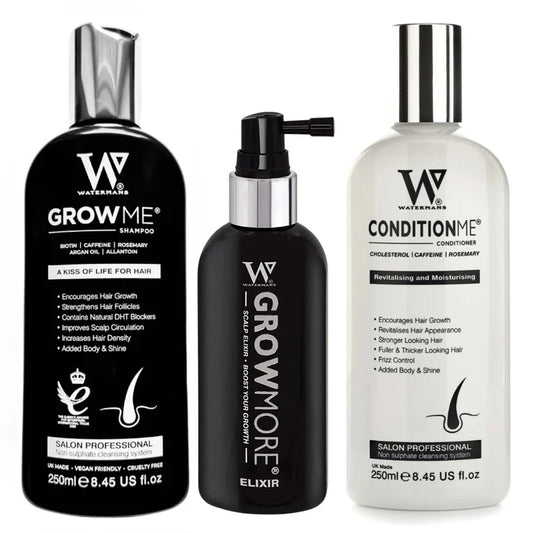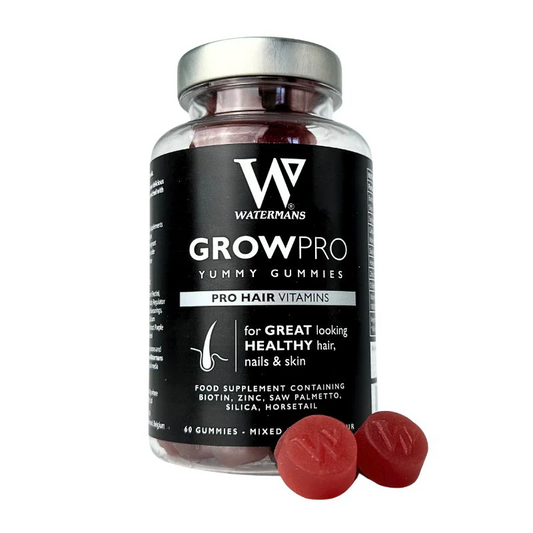Navigating the Challenges of Prolonged Illness: Strategies for Resilience and Recovery
Share

Prolonged Illness: Strategies for Resilience and Recovery to Support Hair Health
Prolonged illness can bring many challenges, one of which is often overlooked: its impact on hair health. Experiencing long-term illness can lead to hair thinning, shedding, and sometimes hair loss. Understanding why this happens and how to manage it can help maintain your confidence and improve your overall well-being during recovery. This comprehensive guide will explore the connection between prolonged illness and hair loss, and introduce effective, natural solutions like Watermans Grow Me Shampoo that can nourish your hair and scalp while supporting new growth.
What Is Prolonged Illness and How Does It Affect Hair?
Prolonged illness refers to any health condition lasting several months or more, such as autoimmune diseases, chronic infections, or long-term recovery from surgery. These illnesses can severely impact your body’s normal functions and energy, often putting your hair into a stress state.
The Science Behind Hair Loss During Illness
Hair grows in cycles, passing through phases of growth (anagen), rest (telogen), and shedding (catagen). During periods of significant physical or emotional stress, like prolonged illness, your body can push more hair follicles than usual into the shedding phase. This condition is medically called telogen effluvium. The hair loss typically appears a few months after the stressful event, which makes it confusing for many.
Additional factors that play a role in this process during prolonged illness include:
- Nutritional deficiencies caused by decreased appetite or poor nutrient absorption.
- Hormonal imbalances related to illness or medication.
- Inflammation and immune responses targeting hair follicles.
- Decreased circulation or scalp health impacting follicle nourishment.
Why Paying Attention to the Scalp and Hair During Illness Matters
Many people believe hair loss from illness is temporary and will correct itself. While sometimes true, neglecting hair health may lead to longer recovery times or more noticeable thinning. The scalp is living skin, and keeping it healthy is essential to support hair growth.
Taking care of your hair and scalp during prolonged illness can:
- Provide essential nutrients to tired hair follicles.
- Stimulate blood flow to improve follicle function.
- Reduce scalp inflammation and dryness.
- Enhance new hair growth and improve hair thickness.
Natural Ingredients That Help Strengthen Hair During and After Illness
When recovering from prolonged illness, choosing gentle, natural haircare products that are free from harsh chemicals is essential. Ingredients with proven benefits for scalp energy, follicle nourishment, and hair volume include:
Biotin
Often called vitamin B7, biotin is key for strong keratin production – keratin is the protein that makes up your hair. Deficiency in biotin can lead to brittle hair and shedding.
Rosemary
Rosemary oil is known for increasing circulation in the scalp and has antioxidants that protect hair follicles from damage.
Caffeine
Caffeine stimulates hair follicles and can help reduce the time hair stays in the shedding phase, promoting quicker regrowth.
Niacinamide (Vitamin B3)
Niacinamide improves scalp barrier function and promotes healthy blood flow to hair roots.
Argan Oil
Rich in fatty acids and antioxidants, argan oil moisturizes the scalp and reduces dryness, a common problem during illness.
Allantoin
Soothes irritated scalp skin and supports healing, encouraging a healthy environment for hair growth.
Lupin Protein
This plant-based protein strengthens hair strands and improves overall hair texture and volume.
Introducing Watermans Grow Me Shampoo: The Best Natural Solution for Hair Loss
For those dealing with hair challenges due to prolonged illness, Watermans Grow Me Shampoo offers an all-in-one, natural remedy. It contains a unique blend of the ingredients described above, working synergistically to energize your scalp and volumize hair from the roots.
Why Choose Watermans Grow Me Shampoo?
- Non-medical and natural: Perfect for those who want effective hair support without harsh chemicals or pharmaceuticals.
- Clinically designed: Created with biotin, caffeine, and rosemary to stimulate growth.
- Safe for sensitive scalps: Gentle formula enriched with allantoin and argan oil.
- Improves scalp health: Niacinamide and lupin protein help rebuild hair quality.
- Suitable for everyday use: Great for ongoing care during illness recovery.
By incorporating this shampoo into your routine, you give yourself the best chance to restore your hair’s natural strength and shine.
Practical Strategies for Managing Hair Loss During Prolonged Illness
Along with using nourishing products like Watermans Grow Me Shampoo, consider these easy-to-follow tips to support hair recovery:
1. Eat a Balanced, Nutrient-Rich Diet
Good nutrition is your hair’s best friend. Focus on foods rich in:
- Protein (lean meats, eggs, beans)
- Vitamins A, C, D, E
- Zinc, iron, and selenium
- Omega-3 fatty acids (salmon, flaxseeds)
These nutrients help rebuild hair structure and improve blood nourishment to follicles.
2. Stay Hydrated
Drinking plenty of water keeps your scalp hydrated and promotes healthy cellular function.
3. Avoid Excess Heat and Chemical Treatments
During illness recovery, hair may be fragile. Minimize use of heat styling tools, harsh dyes, or chemical straighteners.
4. Be Gentle When Brushing and Washing
Use a soft brush and avoid harsh towel-drying that can lead to breakage.
5. Manage Stress with Relaxation Techniques
Since stress worsens hair shedding, practices like meditation, gentle yoga, or deep breathing can help calm your mind and body.
6. Talk to Your Doctor About Medications
Some drugs can increase hair loss. Your healthcare provider might adjust medications or suggest supplements.
7. Regular Scalp Massage
Massaging your scalp daily increases blood flow and relaxes muscles, creating a healthy growth environment.
Understanding Hair Growth Cycles to Set Realistic Expectations
Hair grows about half an inch per month. After prolonged illness, hair follicles may need several months to re-enter the growth phase. It’s typical to notice gradual improvement:
- 1-3 months: Initial reduction in shedding.
- 3-6 months: New fine hairs begin appearing.
- 6-12 months: Hair regains thickness and fullness.
Patience and consistent care with products like Watermans Grow Me Shampoo are key during this timeline.
Hair Loss Myths and Facts Related to Prolonged Illness
Myth 1: Hair loss from illness is permanent.
Fact: Usually, it is temporary and reversible once health improves.
Myth 2: Washing hair too often causes hair loss.
Fact: Gentle washing supports scalp health and removes buildup but avoid harsh shampoos.
Myth 3: Cutting hair makes it grow back thicker.
Fact: Hair thickness is determined by follicles, trimming only makes hair look fuller temporarily.
Myth 4: Stress is the only cause of hair loss in illness.
Fact: Multiple factors including nutrition, medications, and hormone changes contribute.
Did You Know? Hair Loss Facts Related to Prolonged Illness
- Did you know that telogen effluvium affects up to 70% of people experiencing severe physical stress?
- Did you know that scalp inflammation can accelerate hair follicle aging and loss?
- Did you know biotin deficiency is surprisingly common among people with digestive disorders?
- Did you know that caffeine applied topically can stimulate hair follicles within just a few days?
- Did you know vitamin D deficiency is linked to hair thinning in chronic illness?
Frequently Asked Questions (FAQs)
Q1: How soon after an illness does hair loss begin?
Hair shedding typically starts about two to three months after the illness or stress event.
Q2: Can prolonged illness cause permanent bald spots?
Most cases of hair loss from illness are temporary, but conditions like alopecia areata triggered by autoimmune issues may cause patchy loss that requires medical treatment.
Q3: Are there any supplements I should take to help hair growth?
Consult your doctor, but often biotin, zinc, iron, and vitamin D supplements help if you have deficiencies.
Q4: How long will it take to see results with Watermans Grow Me Shampoo?
Users often notice improved scalp health and hair volume within 6-8 weeks of regular use.
Q5: Can I use Watermans Grow Me Shampoo alongside other hair treatments?
Yes, since it’s natural and gentle, it pairs well with other haircare routines.
Q6: Is it safe to use this shampoo if I have a sensitive scalp?
Absolutely. The lotion contains soothing ingredients like allantoin and argan oil designed for sensitive scalps.
Q7: Can stress-related hair loss be reversed completely?
Yes, with time, proper care, and reduced stress, most hair will regrow fully.
Q8: Does hormone imbalance from illness affect hair growth?
Yes, hormones regulate hair cycles, so imbalances can speed up shedding or slow regrowth.
Q9: Should I avoid washing my hair frequently during illness?
No, washing with a gentle shampoo helps maintain scalp health, but avoid hot water and rough handling.
Q10: What lifestyle changes help improve hair growth after illness?
Balanced diet, hydration, stress management, scalp massage, and avoiding harsh styling.
Navigating hair health during prolonged illness can feel overwhelming, but knowledge and natural support go a long way. Prioritize nurturing your scalp and strands with nourishing ingredients, especially those found in Watermans Grow Me Shampoo, to empower your recovery journey with fuller, stronger hair.



